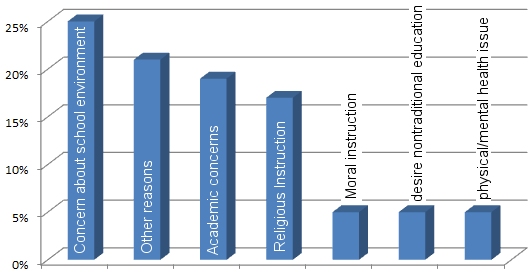
(click for credit)
Since each state has its own laws regarding home education, it is very difficult for the federal government to track homeschooling families. As a result, the estimates regarding the number of homeschooled students is probably low and the sample that was studied is probably not totally representative of the homeschooling population. Also, the detailed statistics are based on a survey called the “Parent and Family Involvement in Education Survey.” Of the more than 17,000 students covered in that survey, only 397 were homeschooled. Thus, the statistics are based on a relatively small sample of students. Nevertheless, some of the results are worth noting.
First, the report tries to adjust its results to take into account the fact that it can’t track all homeschooling families. Based on the data and the subsequent adjustments, the report estimates that there were 1,773,000 students being homeschooled in 2012. This did not include students who were being temporarily homeschooled (because of a long-term illness, for example). This translates to roughly 3.4% of the population, which represents a doubling of the percentage of homeschooled students in 1999 and an 18% increase from the time of the previous report (2007). Needless to say, then, homeschooling is becoming more common.
Before I give you the next interesting statistic, I want you to think about the answer to the following question:
Are homeschooling parents generally more or less educated than the rest of the population?
I have heard people suggest both answers to that question. Some view homeschoolers as people who do not value “real” education, so they are less educated, on average, than the rest of the population. Others view homeschoolers as those who value education more than the rest of the population, so they are more educated. Based on this survey, the education level of homeschooling parents is roughly equivalent to that of the rest of the population. 25% of homeschooling parents have a Bachelor’s degree, while according to the U.S. Census Bureau, 32% of U.S. adults have one. 18% of homeschooling parents have a graduate or professional degree, compared to 12% of U.S. adults. Only about 2% of homeschooling parents don’t have at least a high school degree, compared to about 12% of U.S. adults.
I now want to present the most interesting of all the statistics, but before I do, I want you to once again answer the following question:
What is the most important reason homeschooling parents choose to homeschool their children?
I have asked this question to many friends who homeschool and many friends who do not. By far, most of my friends think that homeschooling parents choose to homeschool primarily for religious reasons. However, that’s not what this survey indicates. The survey asked homeschooling parents for all the reasons they homeschool, and then for the main reason they homeschool. There were several suggestions given, and the parents could also give their own reason. The following graph gives the results for the parents’ most important reason for homeschooling:

As you can see, religious instruction comes in fourth, behind concerns about the school environment, other reasons, and concerns that schools don’t provide adequate academic instruction. That is definitely not what I (or most of my friends) would have predicted! As a side note, you might be interested in what the parents meant by “other reasons.” According to the report, most of those reasons were specific to the particular family, such as travel, finances, and distance to a school.
Homeschooling has definitely changed over the years. As it has become a more common choice among parents, the reasons for making that choice and the type of parents who homeschool have changed. As time goes on, I expect homeschooling to continue to grow as a percentage of the population. As a result, I expect the homeschooling community to become even more diverse in their views and their reasons for homeschooling.

I feel like it should be noted that only about 25% of the parents surveyed said they homeschooled primarily to provide their kids religious or moral instruction. So that was secondary to about 75% of parents who homeschool. I could see how the answers to this question might be difficult to assess, because people can interpret things like “concern about school environment” in many ways and don’t always understand their own motivations, but still. That’s 75% that don’t cite religion or morality as their primary reason for homeschooling.
I haven’t read the report; did the survey ask people to list all their reasons for homeschooling? I wonder how many people cited religious/moral reasons as important. I’m sure that was part of it for my family, but I think the primary reason I was homeschooled was that my elementary school did a bad job of dealing with me.
The survey asked the parents to list all the important reasons for homeschooling, and then to indicate which of those was the most important. 64% listed religious instruction as one of the reasons.
I wish they had asked how many homeschooling parents used to be public school teachers! I can’t tell you how many of the moms in our co-op are certified teachers! I know homeschooling has exploded in our area. I know four families in just our neighborhood.
Well, my wife and I homeschool our kids through a charter school because we feel it offers flexibility with accountability; we can choose curriculum and have a say in how funds are spent on our children’s instruction while still benefitting from the assistance of a resource teacher and the occasional standardized test benchmark. We did send our younger daughter to the local public school kindergarten because she wanted to go and it fit her personality – and she had a great teacher there and did well. We feel that it is key to understand each child as an individual and pick what works for them. Of course, we are odd in that both of us were homeschooled, and although we are in the segment of homeschooling parents without college degrees (we both have some college, but I jumped out to a startup company and then we had kids), I have become a senior engineer anyway. So, while my educational path may not have been “traditional,” it taught me to be creative, think critically, manage my resources, be tenacious and ultimately to succeed. I’ll take that. 😉
As a homeschooling mom, your comment is very encouraging! That’s the mindset we’re trying to instill in our kids. If I was your mom, I’d be very proud of you and your wife.
Dr Jay — how could you? You posted that photo of the trebuchet being built. Now my son will have a bad case of home education envy!
Thanks for the article. I know that home educators elsewhere in the world are seen in light of what goes on in the States, so any data which sheds light on the subject is welcome.
One thing that concerns me is a new development (probably the effect of Aggressive New Atheism), where commentators state that home educating is fine, *except for in Christian families*. They make this fascistic argumentation sound more palatable by using terms such as “fundy” or “religious nutters” to create a pejorative portrait of believers. The data you have shown is ‘good news’ if we consider faith to be something which disqualifies a parent from home educating. It is neutral if we are ready to accept that home educators come from a diverse range of families.
BTW, did the report take account of greater number of African American families turning to education ‘out of school’??
I haven’t read the “homeschooling is fine except for Christians” argument, Anthea. That’s very troubling.
Based on this report, homeschooling is actually decreasing among African American families. In 1999, the report said that 1% of all African American children were being homeschooled. In this report, only 0.7% of all African American students are being homeschooled.
Thanks for your (very) prompt response, Dr Jay. The comments are all over the ‘World Wide Wait’, in the body of online articles and the comments sections — often coupled with a reference to people who are YEC. Esp. common in the UK, where agnostic/atheist home educators will disassociate themselves from people of faith.
I did not know that stat re black families and home education. The news reports in 2015 were all about large rises in the number of African Americans leaving the school system. (Perhaps those articles last year were the result of small, small samples in a survey or two.) Is this latest government report based on some sort of large-scale census?
Excuse the simple questions, I don’t know how the US government gets its information.
It is based on the largest education-related survey of parents. As I say in the article, it doesn’t capture all homeschoolers, because various states deal with homeschoolers in different ways. I wonder if larger numbers of African American students are leaving the public school system and going to private schools instead?
Sorry, I didn’t mean that agnostic home edders will personally disassociate themselves. I mean that they will, in print or online, strive to explain that they aren’t religious and are therefore somehow ‘safer’ candidates for home education. Something like, ‘Not all of us are religious, some of us are quite normal…’
(Mind you, ‘normal’ is rather overrated, I think.)
Dr. Wile,
I came across your blog several months ago while searching for curriculum for a school I wish to open. I was hooked immediately, went back to your first post, and read every post to catch up to the present. I also subscribed to the blog to get the latest updates.
When I had my daughter 30+ years ago (she would not be happy for me to say her age), I wanted to homeschool but there was little support or curriculum available at the time. No internet, no support groups, etc. Now there are so many homeschoolers in my area that the local school district has a homeschool liaison. I live in Florida which is currently a very homeschool friendly State. I am planning on using your science curriculum in my school, which will be a small cottage school with a home atmosphere and self-paced students rather than a traditional private school. Even though I believe homeschooling is best for most, I hope my school will provide a similar benefit. So I guess I will be homeschooling, but other people’s children. I have learned so many things from this blog and even enjoy reading the comments, which tend to be more civil and intelligent than many other blogs I follow.
On a side note, I came across this article posted in a current events education site I subscribe to and thought of you right away. http://www.bbc.com/future/story/20161115-the-viruses-that-may-save-humanity
I hope you had a great Thanksgiving holiday. I look forward to your next post and hope to eventually meet you at a homeschool conference.
Thank you so much for your kind words, Cindy. I think that education is best when parents have many choices at their disposal, including home education, small private schools, large private schools, public schools, and cottage schools such as the one you are planning on running. I pray that you find success in your endeavor.
There was a good review article written a few years ago on the kind of therapy discussed in the link you gave. I found it very interesting.